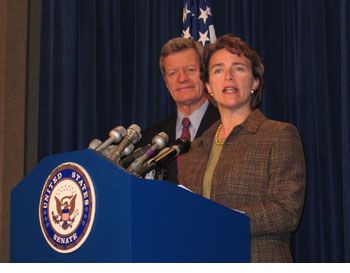 Right now, the biggest battle in bank reform is over a provision introduced by Senator Blanche Lincoln of Arkansas that would force the giant Wall Street banks to give up their lucrative derivative trading businesses if they want the government (i.e. taxpayers) to continue insuring their commercial deposits.
Right now, the biggest battle in bank reform is over a provision introduced by Senator Blanche Lincoln of Arkansas that would force the giant Wall Street banks to give up their lucrative derivative trading businesses if they want the government (i.e. taxpayers) to continue insuring their commercial deposits.
The five biggest Wall Street banks have had the derivatives market (derivatives are bets on whether the price of certain assets will rise or fall, bets thereby “derived” from asset prices) almost entirely to themselves. Last year their revenues from derivatives trading totaled a whopping $22.6 billion. Their advantage comes from their large size, plus government insurance of their commercial deposits that allows them to raise money more cheaply than other financial institutions.
Derivatives lie at the point where the basic saving-and-lending function of commercial banking meets the private casino of Wall Street investment banking. You and I subsidize the biggest players in the casino who, precisely because we subsidize them, have grown too big to fail. The Glass-Steagall Act once prevented the casino from using commercial deposits, but since 1999, when Glass-Steagall was repealed, the game has exploded. That’s part of the reason the giants on Wall Street could make wild bets that ended up threatening the entire economy, costing millions of Americans their jobs and savings, and requiring a massive taxpayer-financed bailout.
Lincoln wants to force the banks to put their derivatives into separate entities that aren’t subsidized by you and me. This is just common sense. Her move would also end the big banks’ monopoly over derivatives, thereby reducing their risk to the financial system. It would also cut dramatically into the big banks’ profits.
Obviously, the big banks are apoplectic about Lincoln’s measure and will do almost anything to strip it from the Dodd bill. The banks have 130 registered lobbyists, countless unregistered ones, 40 former banking staffers, and at least one retired senator (Trent Lott) crawling over Capitol Hill, arguing that Lincoln’s provision would be the end of civilization as we know it.
They also seem to have ensnared Paul Volcker. Late last week Volcker opined that commercial shouldn’t be barred from dealing in derivatives because derivatives are an important aspect of commercial banking; they hedge (that is, provide insurance against) risks associated with interest rates on loans. It’s an odd argument. If derivatives were as essential to the normal practice of lending as Volcker says, you’d expect every commercial bank to be dealing in them instead of just the five giant Wall Street behemoths.
As to the risk you and I might be left holding the bag again, Volcker says not to worry: His own rule now contained in the Dodd bill, preventing bankers from making bets for their own accounts, would take care of that. But Volcker’s rule would not erode the giant banks’ monopoly over derivatives trading — making them too big to fail. By contrast, Lincoln’s provision, by pushing derivative trading out of commercial banking, would remove the big banks’ artificial advantage, resulting in more competition and a better capitalized derivatives market.
Another argument being disingenuously used by Lincoln’s opponents is her measure would push derivative trading into unregulated shadow markets. That’s nonsense. Derivatives would have to be traded through a central clearinghouse or exchange, and every dealer in derivatives would still have to be registered and regulated by the Commodity Futures Trading Corporation or by the SEC.
So what are Lincoln’s chances? All the big guns are aiming at her. Lobbyists are lined up against her. Republicans and many Dems who want to do the Street’s bidding are eager to get rid of Lincoln’s measure. But she has two things going for her. First is the awkwardness for the White House if the President were to come out explicitly against her. For many weeks the Administration has talked about the importance of being tough on derivatives. The President has even said he’ll veto any bill that doesn’t go far enough regulating them. Now Lincoln is giving the White House a chance to prove its mettle or show itself to be pandering to the Street on one of the biggest reasons the Street almost melted down in the fall of 2008.
The second advantage Lincoln has is her measure passed her committee with so much momentum – including the votes of every Dem on the panel and one Republican – that it’s been included in Dodd’s overall financial reform bill. While it’s always possible for opponents of reform to hide when amendments are voted down, it’s much harder to hide when trying to strip a provision from a bill. Democrats who want to do so will have to join Republican Senators Judd Gregg, Saxby Chambliss, and Bob Corker, who already have introduced an amendment to accomplish this on behalf of their Wall Street patrons. The public will be able to identify which Senate Dems care more about Wall Street’s campaign donations than the public good.
Volcker has given these Dems, and the White House, some cover. But the public is watching closely. Some cover may not be enough.


Leave a Reply